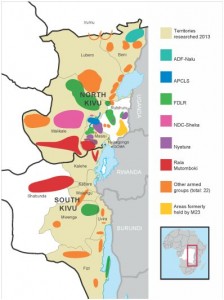
Picture 1: The approximate areas under control of various armed groups at the end of 2013. Source Oxfam
The Democratic Republic of the Congo (DRC) has had a long history of unrest and instability. The rates of sexual violence increased coinciding with the armed conflicts of the early 1990s and later. According to an Oxfam study, some people in North Kivu found that the security situation improved with the defeat of the M23 rebellion. This same study also found that the rates of abuse by members of the FARDC decreased due to an improved chain of command and better trained troops. However, in more remote parts of North and South Kivu, civilians have been far less likely to see an improvement of the security situation.
There are still many armed groups present and still fighting in Eastern DRC as can be seen in this Oxfam produced map of the region. NGOs, Human Rights Defenders and Activists working on gender and/or SGBV all face very serious everyday risks working in this volatile and tense region.
Genderforce Assistance Project in DRC
Since end of 2013, we have been preparing a project in Eastern DRC with an expected launch in mid-2014. It is a unique initiative to combat SGBV and seeks to provide security assistance to local Men’s Networks, Women’s Rights Activists and Human Rights Defenders, as well as direct capability enhancing of National Security Forces. Genderforce has chosen the DRC for reasons that are two-fold:
- The security situation regarding sexual violence in the Eastern DRC is considered to be one of the worst in the world;
- Working alongside our partner organisation, Congo Men’s Network, Genderforce has extensive experience from this region and the current conflict as well as access to influential local contacts.